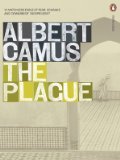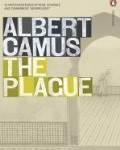 Translated from the French by Robin Buss
Translated from the French by Robin Buss
Five words from the blurb: people, plague, death, isolation, fate
Albert Camus is one of those authors that has always intimidated me. I assumed his writing would be complex and difficult to understand, but eventually my love for disaster based fiction won through and I decided to give The Plague a try. I was surprised by how readable the book was, but disappointed that it lacked the psychological insight I was hoping for.
The book describes the way the Algerian town of Oran copes when a deadly plague breaks out. The first section, describing the emergence of the plague, was promising – it contained intrigue, tension and a dark sense of foreboding.
Everybody knows that pestilences have a way of recurring in the world; yet somehow we find it hard to believe in ones that crash down on our heads from a blue sky. There have been as many plagues as wars in history; yet always plagues and wars take people equally by surprise.
Unfortunately everything went downhill after that. The narrative was written in a calm manner that distanced the reader from the distress that individual families went through. The authorities implemented sensible precautions to prevent the spread of the disease, the people coped surprisingly well and everything seemed under control. Perhaps I’m weird in wanting a bit of panic/disaster to spice things up?
The writing quality was very high, but it felt dated. The public behave very differently now and so it was a glimpse into the past rather than a prediction of the future. The main aim of the book appeared to be analysing the way a population would behave under the threat of an epidemic, but since its publication in 1947 many other books have covered the subject. It may well have been ground breaking on publication, but as a reader in the 21st century it was all well-trodden ground – books like Blindness cover the topic in a much more thorough/eye-opening way.
The book occasionally went off on a tangent, preaching about the inadequacy of religion. These sections felt a little out of place amongst the rest of book and may offend those with a strong faith.
The entire book contained a depth that would reward the re-reader, but I’m afraid it didn’t inspire me enough want to do this. I’m pleased that I’ve read The Plague, if only to see the development of the genre, but unfortunately this isn’t a book that stands the test of time.

.
Have you read The Plague?
Have any of his other books aged better?

23 replies on “The Plague by Albert Camus”
What a pity, Jackie, that The Plague didn’t live up to your expectations. I remember vaguely having read (part of) it ages ago during French class, but apparently it did not leave much of an impression. It just goes to show that even the most brilliant books of a certain period can turn out to be just that: meaningful and important books of that time.
Do you think you will read more books by Camus, after The Plague?
Chinoiseries,
“Do you think you will read more books by Camus, after The Plague?”
I don’t know. I guess that depends on the comments I receive for this post! The quality of his writing means that I would be willing to give him another try, but I’d want to know that the subject matter was worth it. The Plague is supposed to be his best work and I’d worry his other books might feel just as dated. I hope someone comes along to recommend another of his books soon.
I have it on my shelf too. The classics that I read seems all to have a test of time, I am now curious as to how I would feel about this book. Thank you for a very honest review Jackie.
Jo, I’d love to know your thoughts on this too! Perhaps my problems stem from my love for darker stories packed with emotion. It is actually amazing that someone can write a book about the plague with such a gentle outlook. I hope you decide to pick it up soon so that we can compare notes.
I tried reading this last year and it didn’t work for me, either. I didn’t even feel motivated to finish, it was so dull at one point.
Jeane, I agree that some bits were very dull, but it always seemed to pick up again after a little bit so I carried on until the end. It is good to know I’m not alone in not falling in love with this one.
I’m normally all over plague topics, but Camus scares me. I do think I read him in a college literature class but for the life of me I don’t remember which one so it really must have fallen flat with me at that point!
Sandy, I was scared of Camus too, but I don’t think you should be – he is easier to read than I expected. Saying that, I don’t think this book is for you. Not enough plague to satisfy!!
I find it hard to believe than in any time (at least within the last couple of centuries), people would have responded calmly to any kind of calamity. It would be strange reading something about that. I have been seeing a lot more of Camus’ books in the stores lately, but I haven’t yet had the nerve to pick one. I’m glad to hear that this book was very readable.
Athira, It is possible that some of the people didn’t respond calmly to the plague, but the narrator doesn’t mention them. This book is so detached that the reader is barely aware of any suffering. I’d be interested to hear your thoughts on this one, not that I’m recommending it!
I read ‘The Plague’ in French for ‘A’ Level, and in English too – to help my understanding :). But that was a long time ago and I can’t remember much about it or the interpretation our French teacher put on it. I do remember it’s about good and evil and the meaningless or otherwise of life. I’ve also read ‘The Outsider’, which is a much shorter book but at the time I preferred ‘The Plague’. Both are written in a detached style that makes it hard to empathise with the characters.
I re-read ‘The Outsider’ a few years ago and think I understood it better than when I was at school and so I’m tempted to re-read ‘The Plague’ – if only there weren’t so many books I want to read !
Margaret, Yes – there is a big emphasis on the meaningless aspects of our lives. Thank you for letting me know that the ‘The Outsider’ is just as detached. I won’t be in a rush to read it now. Too many other books I’ll enjoy more.
Ah well I’m a fan of The Plague. It isn’t really intended to be in the genre of disaster lit, which is perhaps misleading for you, Jackie. I don’t remember everyone behaving calmly, but you do have the narrator, Rieux, who is determined to battle the plague on his terms – statistics, efficiency, getting on with the job – rather than the terms of the plague which would be all hysteria and hyperbole. So the narrative voice is cold because it comes through him. Surely the death of the child must have affected you? That’s the part I can’t read because I find it too painful. Mind you, I loathe being emotionally manipulated by disastrous events in books, so I’m probably better suited to this one!
Just in case you are interested, I wrote a review of this a while back which you can find here:
http://litlove.wordpress.com/2007/05/03/albert-camuss-the-plague/
litlove, It is interesting that you should mention the little boy as that was one of the best scenes in the book. I actually wasn’t affected by it as a) I’m used to reading far worse and b) I assumed he would survive. The rest of the book had been so detached that I was convinced nothing really bad would happen and so read it assuming he would pull through. I was surprised that he didn’t, but as I hadn’t formed an emotional connection to him it didn’t really affect me.
Thank you for your comment – it was good to read your review and see why you love this book so much. I think I’ll go and try to find some real disaster lit!
I read The Plague one summer during college, after my roommate read it for a class on existential literature and recommended it to me. It was quite a while ago so I don’t remember much, but I did like it. I also resolved not to ever again spend a summer reading something so bleak!
threegoodrats, Thanks for commenting on my blog for the first time!
I’m a bit bizarre in that I like bleak. Not sure what that says about me 🙂
Sometimes I like bleak too, but maybe not in the summer 🙂
I read The Outsider in French for A level so a long time ago but it made a big impression on me at the time. I re-read it in English about 10 or so years ago and still thought it was a great book – if anything it improved as I aged! I haven’t read The Plague so can’t comment. But if you don’t like detached then it probably isn’t the book for you as that’s what the whole premise of it is!
Ros, I’m not a fan of the detached writing style so I’ll stay away from The Outsider – thanks for letting me know that it has a similar style.
My only experience with Camus was reading The Stranger (in French) for a French lit course in college. That was enough to turn me off of him forever. I had such headaches trying to read it in French and then discuss it. Urgh.
Jenners, I can’t imagine trying to read this in French – it is quite difficult vocab. so way above my basic knowledge of the language. Congratulations on giving it a go in the orignal language, even if it did give you a headache!
I am sorry you did not view The Plague as a book that gave you a “psychological insight”. Last year in my high school Honors English class, I did my term paper on Albert Camus, including The Plague. When I chose Camus, my teacher told me he is a great author to read before you have you life figured out, not so much afterwards. I found this to be quite true. The Plague is not mainly about how a population would deal with an epidemic. Instead, it is a story about how something like a plague can strike anyone at any time, and focuses on how certain people cope with something that kills randomly and without meaning. I’d advise you to not give up on Camus yet! Take a look at his philosophy of the absurd, as well as his other works, including The Guest, The Stranger, The Fall, and The Myth of Sisyphus. You may not be able to connect to him or agree with his ideas at all, but you will be able to appreciate his revolutionary viewpoint.
Reese, Thank you for taking the time to defend this book. I can see it is important and he has some interesting ideas. Perhaps I’ll appreiciate this type of book more as I get older? Don’t worry – I won’t rule him out yet!